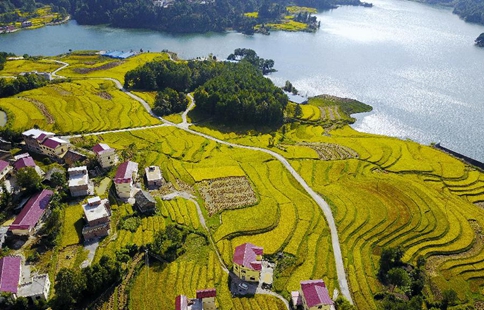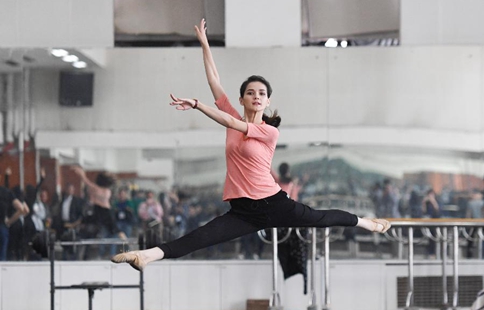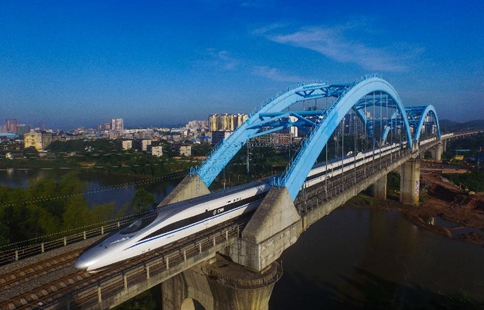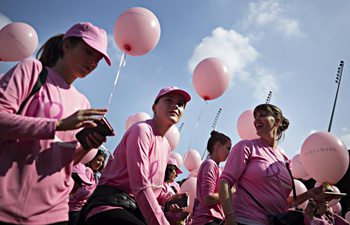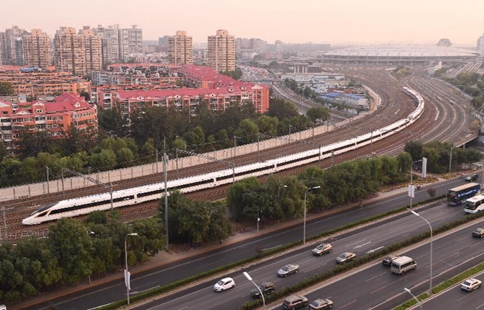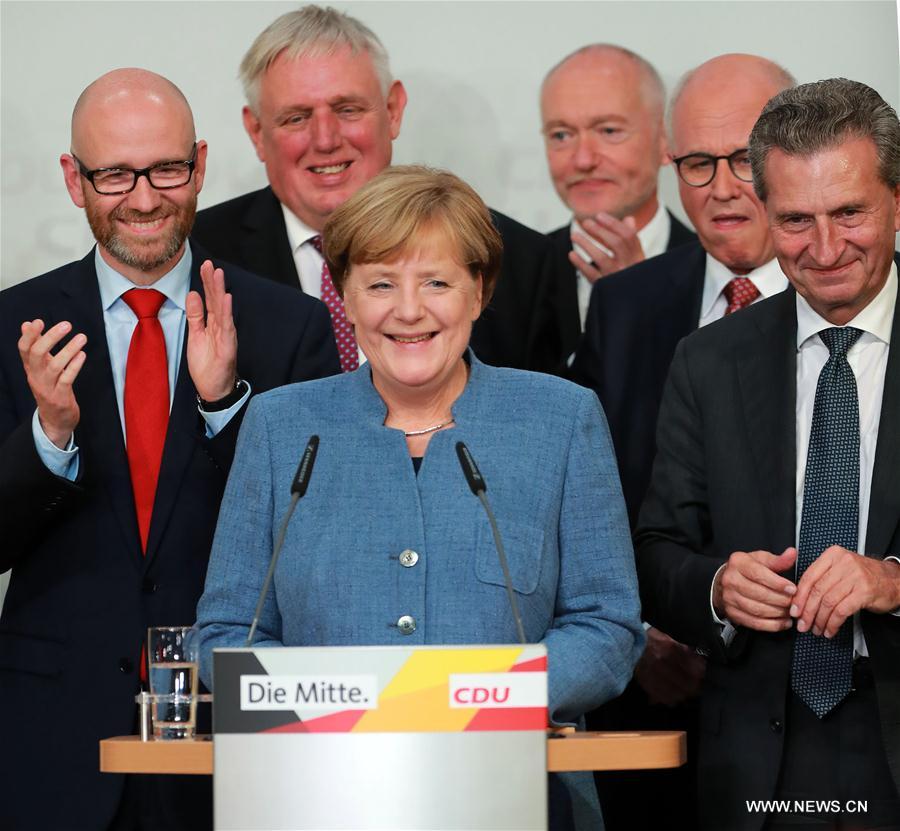
German sitting Chancellor Angela Merkel (Front) is applauded after the preliminary exit poll at the Christian Democratic Union (CDU) party's headquarters in Berlin, Germany, on Sept. 24, 2017. The conservative union led by German sitting Chancellor Angela Merkel on Sunday defended its dominant role in the Bundestag (German parliament) with 32.5 percent of the vote, according to the preliminary exit poll. (Xinhua/Luo Huanhuan)
BERLIN, Sept. 25 (Xinhua) -- The new federal German parliament, the Bundestag, will house more representatives than ever before, according to preliminary results released by the chief federal election official on Monday.
Both parties of the grand coalition between the Social Democratic Party (SPD) and Chancellor Merkel's Christian Democratic Union (CDU) have lost a large amount of voter support. The right-wing Alternative for Germany (AfD) is the third strongest force gaining voters from all political camps and mobilizing non-voters.
Merkel is to remain chancellor, but the negotiations on coalitions are likely to be difficult. The incumbent chancellor will preside over four more years, but the party suffered great losses.
Merkel said she had hoped for a better result, but that the union had achieved its strategic objectives to become the strongest force and now it had the mandate to form a government. She rejected speculation about a possible minority government.
"I do not see this. I have the intention that we should achieve a stable government in Germany," Merkel told public broadcasters ARD and ZDF.
The preliminary result announced by election officials early on Monday are as follows. CDU and its sister party the Christian Social Union (CSU) received 33 percent of the votes. The SPD received its lowest level of support in a federal election at 20.5 percent. The AfD will be the third-strongest party represented in parliament with 12.6 percent. The liberal democrat party FDP successfully re-entered the Bundestag after a four-year break with 10.7 percent. The Greens received 8.9 percent and The Left 9.2 percent. Voter participation rose to 76.2 percent compared to 71.5 percent in 2013.
A six-party parliament will be formed for the first time since the 1950s.
The governing bodies of the parties will discuss the results of the election early Friday. Both the FDP and the Greens expressed their willingness to enter into negotiations about an CDU/FDP/Greens coalition, albeit with great obstacles to overcome on issues such as energy and immigration policies. This so-called Jamaica coalition would have a majority of 393 seats.
FDP leader Christian Lindner wants to make his party's coalition involvement contingent upon the degree of agreement on political contents. Meanwhile, Greens candidate Katrin Goering-Eckardt also anticipates difficult talks, stating: "We will not be an easy partner." In light of these difficulties, the CDU appealed to the SPD not to refuse coalition talks.
Despite a grand coalition between CDU and SPD being mathematically possible, SPD leader and chancellor candidate Martin Schulz rejected a renewal of the coalition. "It is quite clear that the electoral mandate to us is to form the opposition," Schulz said. After the crushing defeat in the election he said he did not want to lead the SPD parliamentary fraction but stated his intention to remain party chairman.
Prior to the election all parties expressed their unwillingness to enter into a coalition with the right-wing populist AfD which received a very high level of voter support, especially in the eastern German states. The party is the second strongest there with 20.5 percent voter support and even stronger in the state of Saxony with 27 percent. In the west German states, it reached 10.7 percent, according to ARD.
Protests against the anti-immigrant party gathered several hundred participants in Berlin as well as other German cities.
Merkel said that her party wanted to win back the AfD voters "by solving problems, by taking up their worries and also, partially, their fears, but above all with good politics." Schulz, however, attributed a "great responsibility" for the rise of right-wing populism to Merkel. "The systematic refusal of politics has created a vacuum that has been filled by the AfD," Schulz said.
AfD top candidate Alexander Gauland reiterated his intention to lead a fierce opposition within the future federal government for which Merkel would have to prepare well.
"We will hunt her," he said in regard to the chancellor. We will take back our land and our people," he said.






